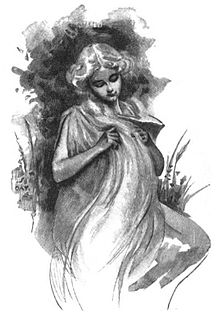Sif
Scholars have proposed that Sif's hair may represent fields of golden wheat, that she may be associated with fertility, family, wedlock and/or that she is connected to rowan, and that there may be an allusion to her role or possibly her name in the Old English poem Beowulf.
In the Prose Edda, Sif is mentioned once in the Prologue, in chapter 31 of Gylfaginning, and in Skáldskaparmál as a guest at Ægir's feast, the subject of a jötunn's desire, as having her hair shorn by Loki, and in various kennings.
Sif is introduced in chapter three of the Prologue section of the Prose Edda; Snorri's euhemerized account of the origins of Norse mythology.
[8] Although he lists her own ancestors as unknown, Snorri writes that Thor and Sif produced a son by the name of Lóriði, who "took after his father".
[9] In chapter 31 of the Prose Edda book Gylfaginning, Ullr is referred to as a son of Sif and a stepson of Thor (though his father is not mentioned): Ull is the name of one.
Prior to this, Hrungnir had been drunkenly boasting of his desire to, amongst other things, kill all of the gods except Freyja and Sif, whom he wanted to take home with him.
As the story progresses, the incident leads to the creation of the ship Skíðblaðnir and the boar Gullinbursti for Freyr, the multiplying ring Draupnir for Odin, and the mighty hammer Mjöllnir for Thor.
[16] 19th-century scholar Jacob Grimm records that in his time residents of Värmland, Sweden "call[ed] Thor's wife godmor, good mother.
In the Old English poem Beowulf (lines 2016 to 2018), Hroðgar's wife, Wealhþeow, moves through the hall serving mead to the warriors and defusing conflict.
Nowhere amongst us is the mystic relation of the seed-corn of Demeter, whose poignant grief for her daughter threatens to bring famine on mankind (Hymn to Cer.
"[22] Citing the etymology of her name, 19th century scholar Guðbrandur Vigfússon theorizes that Sif "betokens mother earth with her golden sheaves of grain; she was the goddess of the sanctity of the family and wedlock".
[23] Scholar H. R. Ellis Davidson states that Sif may have been an ancient fertility goddess, agreeing with a link between her lustrous hair and fields of golden wheat.
This included the fruitfulness of the fields, and Thor, although pictured primarily as a storm god in the myths, was also concerned with the fertility and preservation of the seasonal round.
In our own times, little stone axes from the distant past have been used as fertility symbols and placed by the farmer in the holes made by the drill to receive the first seed of spring.
Lindow further states that it may be easy to lose sight of the central role Sif plays in the creation of these objects.
N. A. Nielsen suggests that she was married to Njord before the Æsir–Vanir War,[29] an interpretation which depends on considering Ullr identical with Freyr, which Rudolf Simek characterizes as "very precarious.
[33][34] Lady Sif appears in Santa Monica Studio's 2022 video game God of War Ragnarök, where she is voiced by Emily Rose.





